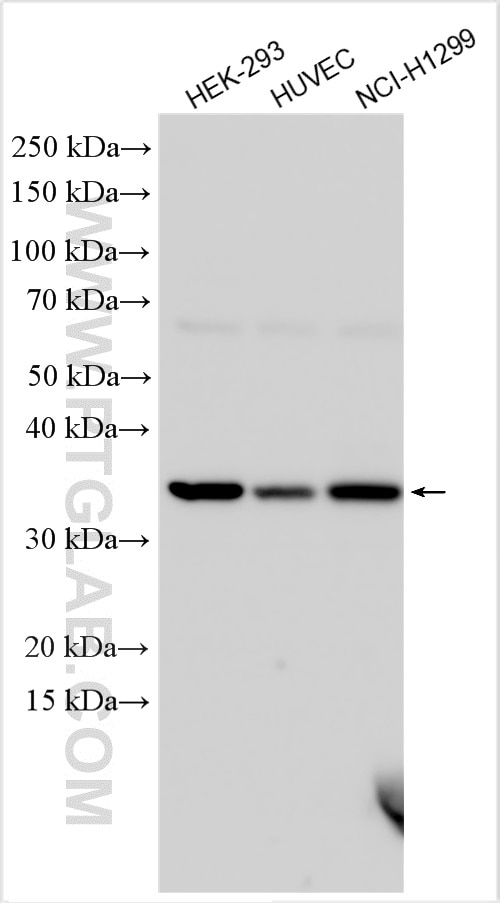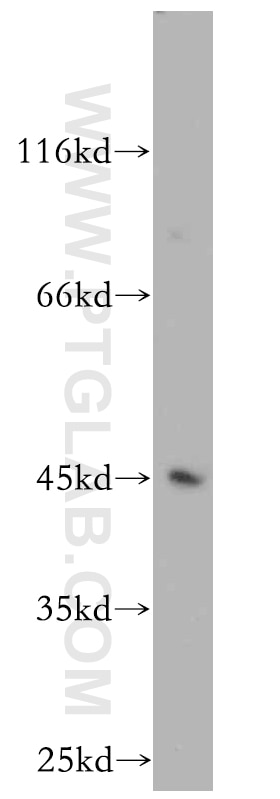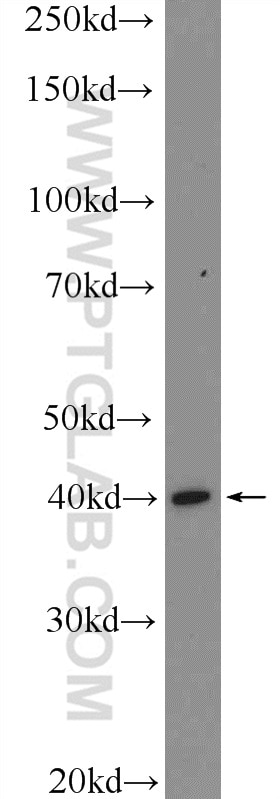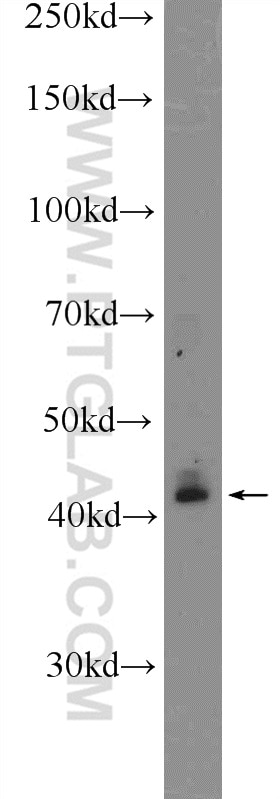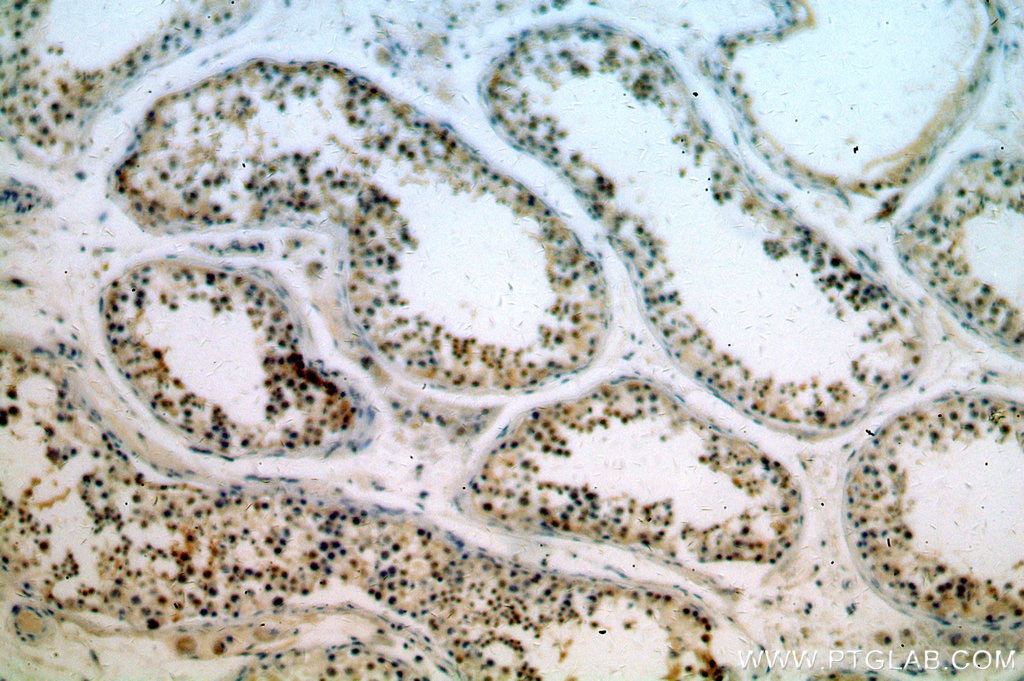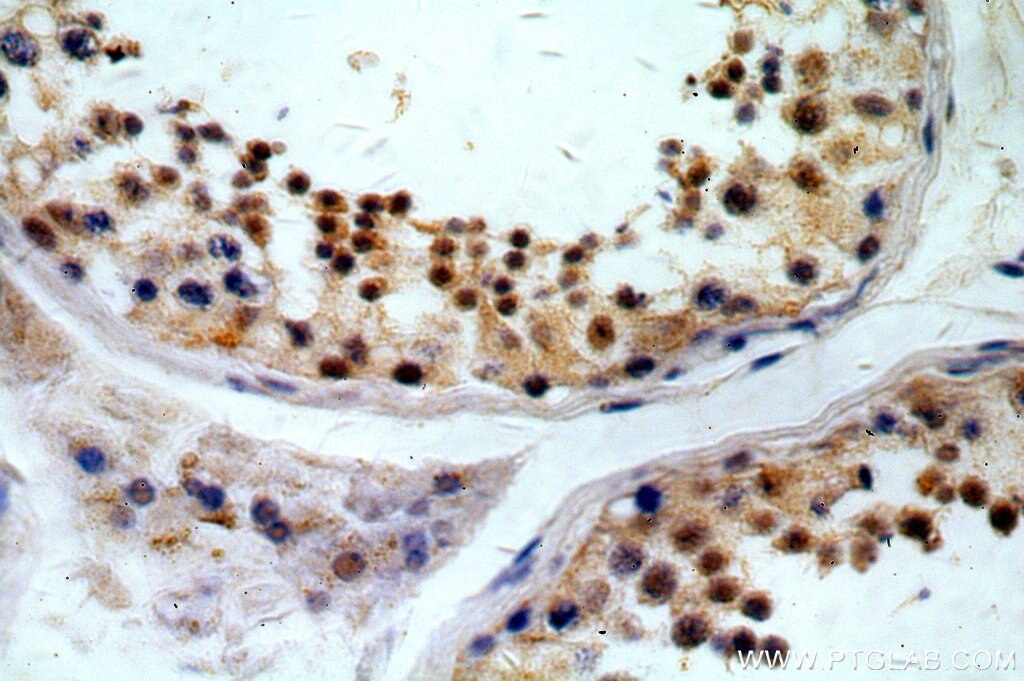Tested Applications
| Positive WB detected in | HEK-293 cells, mouse thymus tissue, mouse colon tissue, HUVEC cells, NCI-H1299 cells |
| Positive IHC detected in | human testis tissue Note: suggested antigen retrieval with TE buffer pH 9.0; (*) Alternatively, antigen retrieval may be performed with citrate buffer pH 6.0 |
Recommended dilution
| Application | Dilution |
|---|---|
| Western Blot (WB) | WB : 1:1000-1:5000 |
| Immunohistochemistry (IHC) | IHC : 1:20-1:200 |
| It is recommended that this reagent should be titrated in each testing system to obtain optimal results. | |
| Sample-dependent, Check data in validation data gallery. | |
Published Applications
| KD/KO | See 1 publications below |
| WB | See 20 publications below |
| IHC | See 3 publications below |
| IF | See 5 publications below |
| ChIP | See 1 publications below |
Product Information
14716-1-AP targets KLF6 in WB, IHC, IF, ChIP, ELISA applications and shows reactivity with human, mouse, rat samples.
| Tested Reactivity | human, mouse, rat |
| Cited Reactivity | human, mouse, rat |
| Host / Isotype | Rabbit / IgG |
| Class | Polyclonal |
| Type | Antibody |
| Immunogen |
CatNo: Ag6440 Product name: Recombinant human KLF6 protein Source: e coli.-derived, PGEX-4T Tag: GST Domain: 6-283 aa of BC000311 Sequence: MCSIFQELQIVHETGYFSALPSLEEYWQQTCLELERYLQSEPCYVSASEIKFDSQEDLWTKIILAREKKEESELKISSSPPEDTLISPSFCYNLETNSLNSDVSSESSDSSEELSPTAKFTSDPIGEVLVSSGKLSSSVTSTPPSSPELSREPSQLWGCVPGELPSPGKVRSGTSGKPGDKGNGDASPDGRRRVHRCHFNGCRKVYTKSSHLKAHQRTHTGEKPYRCSWEGCEWRFARSDELTRHFRKHTGAKPFKCSHCDRCFSRSDHLALHMKRHL Predict reactive species |
| Full Name | Kruppel-like factor 6 |
| Calculated Molecular Weight | 32 kDa |
| Observed Molecular Weight | 32-42 kDa |
| GenBank Accession Number | BC000311 |
| Gene Symbol | KLF6 |
| Gene ID (NCBI) | 1316 |
| RRID | AB_10640526 |
| Conjugate | Unconjugated |
| Form | Liquid |
| Purification Method | Antigen affinity purification |
| UNIPROT ID | Q99612 |
| Storage Buffer | PBS with 0.02% sodium azide and 50% glycerol, pH 7.3. |
| Storage Conditions | Store at -20°C. Stable for one year after shipment. Aliquoting is unnecessary for -20oC storage. 20ul sizes contain 0.1% BSA. |
Background Information
KLF6(krupple-like factor 6) is a zinc finger transcription factor and tumor suppressor with biological activities and transcriptional targets in growing range. It is highly expressed in placenta followed by spleen, thymus, prostate, testis, small intestine and colon. One key target gene of KLF6 in endoglin, which is a homodimeric cell membrane glycoprotein and TGF-β auxiliary receptor, owns a pro-angiogenic role in endothelial cells and is also involved in malignant progression. Also KLF6 induces apoptosis in prostate cancer cells through upregulation of ATF3. KLF6 has 3 isoforms with the molecular mass of 32, 31 and 26kDa. KLF6 was normal detected as a 46kDa protein, which is larger than translation product(32kDa), because of post-translational modification including both phosphorylation and glycosylation. This antibody raise against the full length of KLF6 gene of human origin, and can recognize both of KLF6, included KLF6(~32kDa), p-KLF6(~35-46kDa), Highly ubiquitinated KLF6(~60kDa). Otherwise, there may be a non-specific band(50kDa) showed in detection
Protocols
| Product Specific Protocols | |
|---|---|
| IHC protocol for KLF6 antibody 14716-1-AP | Download protocol |
| WB protocol for KLF6 antibody 14716-1-AP | Download protocol |
| Standard Protocols | |
|---|---|
| Click here to view our Standard Protocols |
Publications
| Species | Application | Title |
|---|---|---|
Adv Sci (Weinh) Exosomal miR-181d-5p Derived from Rapamycin-Conditioned MDSC Alleviated Allograft Rejection by Targeting KLF6 | ||
Nutrients The Growth of SGC-7901 Tumor Xenografts Was Suppressed by Chinese Bayberry Anthocyanin Extract through Upregulating KLF6 Gene Expression. | ||
J Ethnopharmacol Salvia miltiorrhiza bunge exerts anti-oxidative effects through inhibiting KLF10 expression in vascular smooth muscle cells exposed to high glucose. | ||
Front Genet Revealing Potential Spinal Cord Injury Biomarkers and Immune Cell Infiltration Characteristics in Mice. | ||
Front Physiol MiR-181d-5p Targets KLF6 to Improve Ischemia/Reperfusion-Induced AKI Through Effects on Renal Function, Apoptosis, and Inflammation. | ||
Bioengineered MicroRNA-124 modulates neuroinflammation in acute methanol poisoning rats via targeting Krüppel-like factor-6. |
Reviews
The reviews below have been submitted by verified Proteintech customers who received an incentive for providing their feedback.
FH Paulo (Verified Customer) (03-01-2019) | Used to perform ChIP-seq in ccRCC cell lines. 20ug of antibody used in 100million cells. No peaks were detected in known target genes and obtained peaks failed to present the consensus KLF6 binding site after motif analysis.
|

